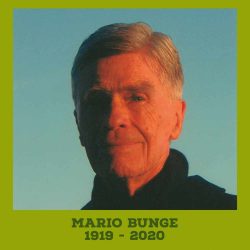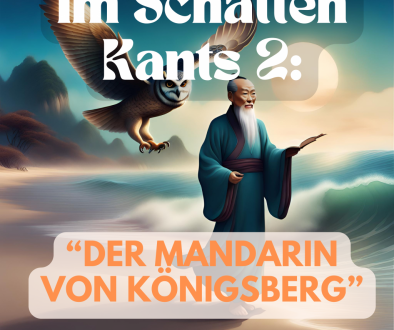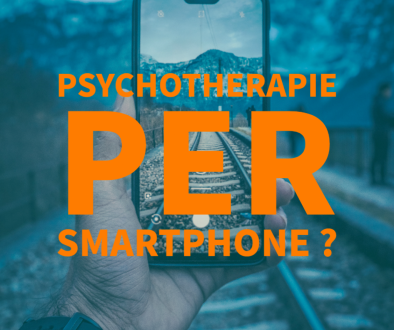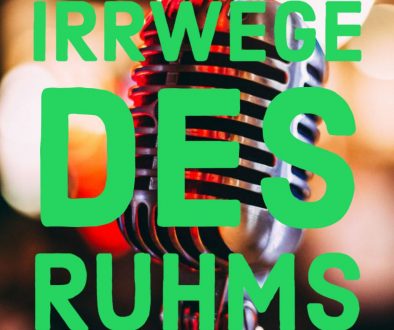Obituary: Mario Bunge – Physicist, Philosopher, Champion of Science, and Citizen of the World (1919-2020)
Mario Bunge, the centenarian Argentine/Canadian physicist/philosopher passed away in the loving company of his wife Marta and children Eric and Silvia on 24th February 2020 in Montreal.
Bunge, five years ago, wrote a 500-page autobiography HERE. By drawing upon his prodigious memory for decades-old readings, events and conversations, it laid out in fascinating detail his personal, family, cultural and scholarly life. The Memoir is enormously educative and a delight to read. It has 1,200 entries in its Name Index. He manages to say something insightful about the life and work of nearly every person mentioned in the Index. It is a ‘Who’s Who?’ of modern South American, Anglo-American, and European physics and philosophy. The book with ample quotations is reviewed HERE. A 30-page account of Bunge’s life, achievements and central philosophical positions can be read HERE. His scientific, philosophical, social and educational positions are elaborated and appraised in a recent 41-chapter Festschrift HERE.
In 70 books and 540 articles , written over an 80-year span, he made substantial contributions to physics, philosophy of physics, metaphysics, methodology and philosophy of science, philosophy of mathematics, philosophy of psychology, philosophy of social science, philosophy of biology, philosophy of technology, moral philosophy, social and political philosophy, medical philosophy, criminology, legal philosophy and education HERE. At age 98 he published on the philosophical, specifically ontological, implications of the discovery of Einstein’s postulated gravitational waves HERE.
For many, Bunge’s realist interpretation of quantum mechanics was his major contribution to modern physics. In 2003 he surveyed the arguments in his ‘Twenty-Five Centuries of Quantum Physics: From Pythagoras to Us, and from Subjectivism to Realism’ HERE. In a journal double-issue, ten physicists and philosophers laid out and appraised his ‘signature’ account of quantum mechanics, with Bunge replying HERE.
The unifying thread of Bunge’s life and research is the constant and vigorous advancement of the Enlightenment project that brings science and philosophy together for the advancement of human welfare. He expended the same energy on criticism of cultural and academic movements that deny or devalue the core principles of the project: naturalism; the search for objective, trans-personal, non-subjective truth; the universality of science; the value of rationality; and respect for individuals.
Bunge’s passing is a loss for his family and the scholarly world. Hopefully some in the succeeding generations of philosophers, physicists and educators will be inspired to emulate his example of a wide-ranging, in-depth, cosmopolitan approach to the advancement of knowledge and the formation of a more just and equitable society. He embodies the best, and more, of the liberal education ideal.
Obituaries in the Spanish press can be read HERE, HERE and HERE.
It was in 2007 when I read in a German textbook on sociological theory several references to Mario Bunge’s work on philosophy of science for the social sciences.
A short time later I had read and evaluated all his inspiring texts on this topic. Through this reading I was inspired to develop a scientifically based theory for the analysis of social opinion-forming mechanisms.
I presented my plans for the final writing of my two-volume book „Kommunikation“ to Mario Bunge via email contact to get feedback from him.
In fact, he took the time to comment on my outline and finally my books. He supported me with essays and book volumes from his library, which he sent me.
The written correspondence turned into friendship and finally we met personally in 2014 on the occasion receiving the Bertalanffy Award in Wien.
In the following years we regularly found opportunities to write each other and exchange topics and papers. – By the way: He was the most disciplined „writing partner“ I know – he always answered within the shortest time.
Usually I wrote to him in English, while he took the opportunity to answer me in German – the language of his beloved mother Mariechen.
My last two emails, one from September – on the occasion of his birthday – and one from December – on the occasion of the end of the year – remained unanswered, so I was quite worried … Which, as we can now see, was justified.
With Mario Bunge, probably the most educated person who has ever lived in this world has left us. It was an honour to be able to exchange thoughts with him and learn from him (interview with him).
What a great loss at a time when mankind has a huge need for critical, scientifically trained rationality!
Heinz-Wilhelm Droste on 2 March 2020
(Übersetzung)
Mario Bunge, der hundertjährige argentinisch-kanadische Physiker/Philosoph, ist am 24. Februar 2020 in Montreal in der liebevollen Begleitung seiner Frau Marta und der Kinder Eric und Silvia verstorben.
Bunge hat vor fünf Jahren eine 500-seitige Autobiographie geschrieben. Sie schöpft aus seinem wunderbaren Gedächtnis für jahrzehntelange Lesungen, Ereignisse und Gespräche und legt in faszinierenden Details sein persönliches, familiäres, kulturelles und wissenschaftliches Leben dar. Die Memoiren sind enorm lehrreich und eine Freude zu lesen. Es hat 1.200 Einträge in seinem Namensverzeichnis. Es gelingt ihm, etwas Aufschlussreiches über das Leben und die Arbeit fast aller im Index erwähnten Personen zu sagen. Es ist ein „Who’s Who“ der modernen südamerikanischen, angloamerikanischen und europäischen Physik und Philosophie. Das Buch mit zahlreichen Zitaten wird rezensiert. Ein 30-seitiger Bericht über Bunge’s Leben, Errungenschaften und zentrale philosophische Positionen kann gelesen werden. Seine wissenschaftlichen, philosophischen, sozialen und pädagogischen Positionen werden in einer kürzlich erschienenen 41-teiligen Festschrift ausgearbeitet und bewertet.
In 70 Büchern und 540 Artikeln, die er über einen Zeitraum von 80 Jahren geschrieben hat, leistete er wesentliche Beiträge zu Physik, Physikphilosophie, Metaphysik, Methodologie und Wissenschaftstheorie, Mathematikphilosophie, Psychologiephilosophie, Sozialphilosophie, Biologiephilosophie, Technologiephilosophie, Moralphilosophie, Sozial- und politische Philosophie, Medizinphilosophie, Kriminologie, Rechtsphilosophie und Pädagogik. Im Alter von 98 Jahren veröffentlichte er über die philosophischen, insbesondere ontologischen, Implikationen der Entdeckung der von Einstein postulierten Gravitationswellen.
Für viele war Bunge’s realistische Interpretation der Quantenmechanik sein Hauptbeitrag zur modernen Physik. Im Jahr 2003 überprüfte er die Argumente in seinen ‚Fünfundzwanzig Jahrhunderten der Quantenphysik‘: Von Pythagoras zu uns und vom Subjektivismus zum Realismus‘. In einer Zeitschriften-Doppelausgabe haben zehn Physiker und Philosophen seine ‚Signatur‘ der Quantenmechanik dargelegt und bewertet, wobei Bunge antwortete.
Der verbindende Faden von Bunges Leben und Forschung ist die ständige und energische Weiterentwicklung des Aufklärungsprojekts, das Wissenschaft und Philosophie zur Förderung des menschlichen Wohlergehens zusammenbringt. Dieselbe Energie wendete er auf die Kritik an kulturellen und akademischen Bewegungen auf, die die Kernprinzipien des Projekts leugnen oder abwerten: Naturalismus, die Suche nach objektiver, trans-persönlicher, nicht-subjektiver Wahrheit, die Universalität der Wissenschaft, den Wert der Rationalität und den Respekt vor dem Individuum.
Bunges Ableben ist ein Verlust für seine Familie und die wissenschaftliche Welt. Es bleibt zu hoffen, dass sich einige der nachfolgenden Generationen von Philosophen, Physikern und Pädagogen dazu inspirieren lassen, seinem Beispiel eines weitreichenden, tiefgreifenden, kosmopolitischen Ansatzes zur Förderung des Wissens und zur Bildung einer gerechteren und ausgewogeneren Gesellschaft nachzueifern. Er verkörpert das Beste und mehr vom liberalen Bildungsideal.
Es war im Jahr 2007, als ich in einem deutschen Lehrbuch über soziologische Theorie mehrere Hinweise auf Mario Bunge’s Arbeit über Wissenschaftsphilosophie für die Sozialwissenschaften las.
Kurze Zeit später hatte ich alle seine inspirierenden Texte zu diesem Thema gelesen und ausgewertet. Durch diese Lektüre wurde ich inspiriert, eine wissenschaftlich fundierte Theorie zur Analyse sozialer Meinungsbildungsmechanismen zu entwickeln.
Meine Pläne für das endgültige Schreiben meines zweibändigen Buches „Kommunikation“ stellte ich Mario Bunge per E-Mail-Kontakt vor, um von ihm ein Feedback zu erhalten.
Tatsächlich nahm er sich die Zeit, meine Skizze und schließlich meine Bücher zu kommentieren. Er unterstützte mich mit Essays und Buchbänden aus seiner Bibliothek, die er mir schickte.
Aus der schriftlichen Korrespondenz wurde eine Freundschaft, und schließlich trafen wir uns 2014 anlässlich der Verleihung des Bertalanffy-Preises in Wien persönlich.
In den folgenden Jahren fanden wir regelmäßig Gelegenheiten, uns gegenseitig zu schreiben und Themen und Beiträge auszutauschen.








